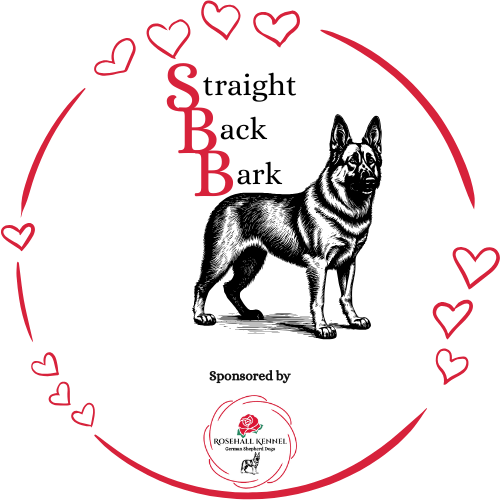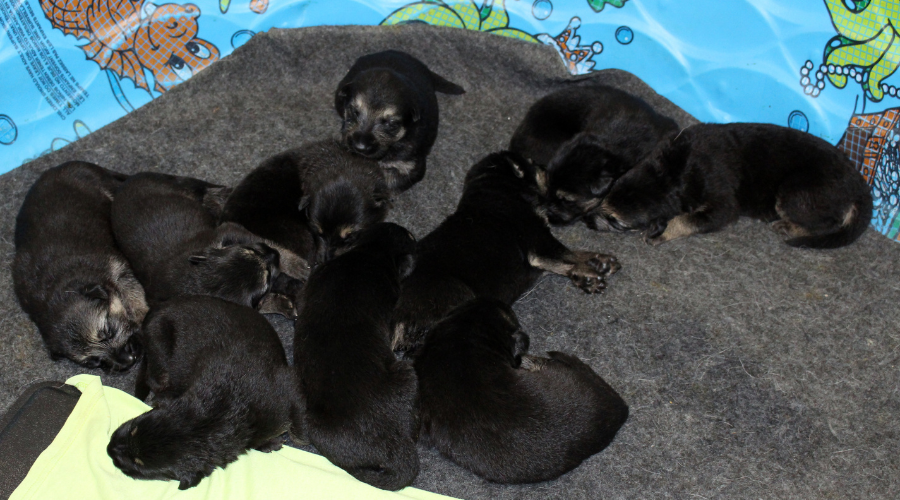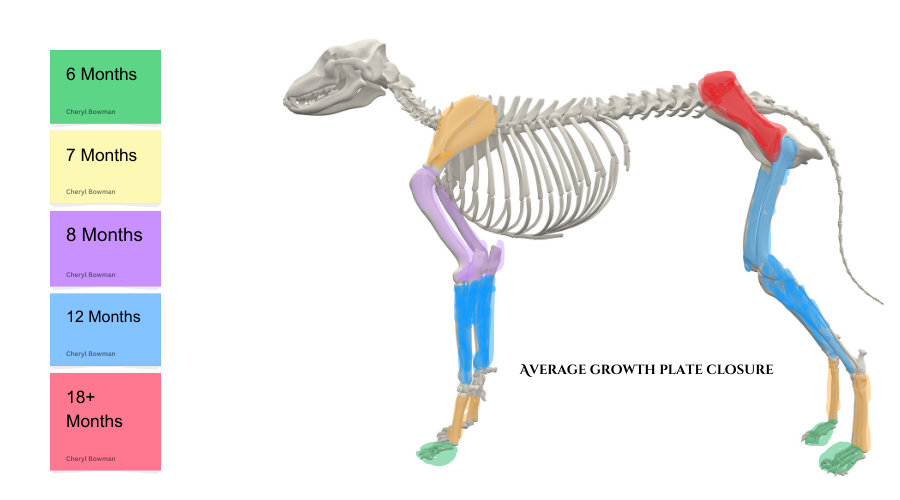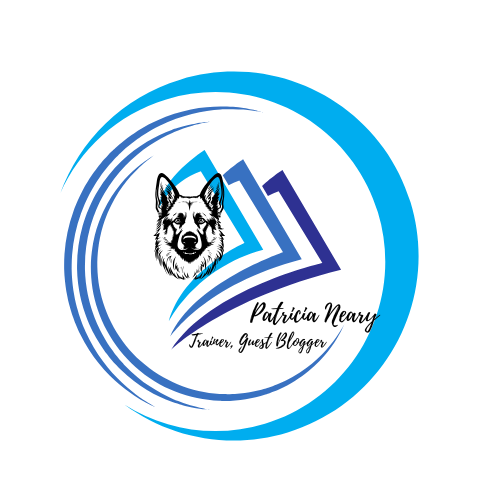It can be tempting to exercise German Shepherd puppies to drain that unlimited puppy energy, but it's important to keep in mind the impact exercise can have on puppy growth plates. German Shepherd puppy owners often have questions about running, competing and jumping. These are all important questions, as we want to have fun while engaging with our puppy.
At the same time, there is no doubt about the fact that puppies love to touch and move, even to the point of exhaustion; as with most things in life, too much of a good thing can have an impact. In this case, the impact can have significant harmful effects on the skeletal system in puppy development.
Keep in mind that the time frames for growth plate closure are for normal-sized German Shepherd dogs. Your Rosehall GSD is a large dog, which means it can take up to 24 months, and sometimes longer, for the growth plates to close.
What Are Puppy Growth Plates?
The puppies' bones are surrounded by layers of developing soft cartilage tissue that lies toward the end of most of a puppy's long bones. These areas of soft cartilage are known as epiphyseal plates (growth plates).
Scottish surgeon John Hunter studied growth plates in great detail at the end of the 18th century. His studies of growing chickens revealed that the bones do not develop from the center outward, but the bones grow lengthwise, as new bone is generated at the end of the long bones, right where the growth plates are located.
John Hunter's studies earned him the nickname "father of the growth plate," and his contributions have helped humans and animals alike. Since growth plates are made of soft, developing cartilage, they are vulnerable and can be quite prone to injuries.
Damage to the Puppy's Growth Plates
When it comes to the skeletal development of puppies, puppies' bones must experience uniform growth—basically synchronized growth that occurs evenly and as close to the same speed as possible.
If an injury occurs to a growth plate, the growth of damaged cells can slow down and stop, meaning there can no longer be growth on one side. When the growth of the affected side is delayed and stopped, the healthy and affected side can continue to grow, and this irregularity can lead to potential deformity. When the injured growth plate of the calf stops growing, the radius of the bone will continue to grow, potentially leading to a bone that is slightly longer than the other and causing arched legs.
Puppies are prone to injury during vigorous exercise because they lack coordination and don't have much muscle strength. In addition to excessive and strenuous exercise, injuries to a puppy's growth plates can occur due to a fracture, such as it can occur from a fall or being hit by a car. While these fractures can heal, the bone can grow unevenly and can lead to bone deformity. If, therefore, you suspect an injury to your puppy's growth platelets or notice any abnormality, consult your veterinarian immediately.
Prevention of Injury on Puppy Growth Plate
German Shepherd puppies need proper exercise as they grow and develop, but moderation is key. Therefore, it is important to be especially careful with high-impact activities, such as repetitive jumping, catching a frisbee, throwing obstacles or jogging, especially on hard surfaces like asphalt or concrete. Turf offers a more tolerant surface and better traction compared to hard concrete or asphalt. Avoid sustained vigorous exercise, leg twisting activities or very rough play.
When Can My German Shepherd Puppy Start Competing in Agility?
Many puppy owners may find it surprising when trainers tell them their puppies are too small to start competing in agility. However, puppy owners can start their puppies with some basic pre-agility concepts, such as familiarizing themselves with agility obstacles and other basic skills/exercises that are not high impact and, therefore, will not put pressure on those delicate growth plates. Check with your vet and agility coach to find out when you can start.
When Do Puppy Growth Plates Close?
As German Shepherd puppies develop, their growth plates close as calcium and minerals harden soft areas. Since dogs develop at different rates depending on size and breed, there's not one rule that fits all.
For example, growth plates on a Chihuahua will close much sooner than in larger breeds, such as a Great Dane. Generally, the majority of skeletal growth occurs when puppies are between three and six months of age. Later, longitudinal growth decreases, and from 10 to 18 months in medium dogs or up to 24 months in large/giant dog breeds, most growth plates have fused and closed. However, some suggest that the process can take longer than 24 months in giant breeds.
Knowing When a GSD's Growth Plates Close
The best option is to talk to your vet before starting puppies on any rigorous exercise regimen or sports training.
For added peace of mind, consider an X-ray to see if the bones have fused or not. A veterinarian will be able to determine if the growth plate has transformed into a solid, integral part of the bone.
"Most sports medicine vets recommend not starting training until the growth plate closes, which depends on the size of the breed and can be between 10 months and 18 months of age." ~ Dr. Wendy Baltzer.
Safe Play for German Shepherd Puppies
Having a German Shepherd puppy can be challenging at times. Keeping your puppy safe while active and draining your puppy's energy takes careful thought and consideration. Many puppy owners take their puppies on long walks for exercise and to drain energy, which can damage growth plates.
A few tips and fun activities that you can do together include:
- Training: Enroll in a puppy obedience class to teach your puppy new skills to tire it by exercising its brain, which burns energy.
- Puppy Daycare or Puppy Camp Programs: Your puppy will play and engage with other puppies, and at the end of the day, you have a very happy and tired puppy.
- Confetti Party: Place some kibble, treats or both in a bowl, then flip the bowl. These yummy treats and kibble will land in different places on the floor, and your puppy will have to search and sniff for them. Once your puppy finds a treat or kibble, he will self-reward by eating his prize. Do this three or four times, and it will tire out your puppy. However, keep in mind the amount your puppy eats—be sure to count these treats in the puppy's daily allowance of food so it doesn't become overweight.
- Flirt Pole: A flirt pole is the puppy's version of a cat's fishing pole. The end of the pole has either a tug or tassels. As you move the pole, keep it low to the floor. Your puppy's play and prey drive will kick in as your puppy chases it. Let him catch it, and once he lets go, move it around again. This exercise is so much fun for both you and your puppy; plus, you are having fun tiring out your puppy. You can purchase a flirt pole on Amazon from your local pet store.
- Box Search Games: These games are an introduction to nose work. Fold the lids open on four boxes of any size. Place the boxes in two rows or a circle. Place food or treats in a box. With your puppy on a leash, give it a command word such as "Search" or, in German, "Suche (pronounced 'sook'). Your puppy will check each box. Once your puppy finds the food or treats, let it eat them from the box. Reward again by holding food or treats next to the box. Once your puppy becomes proficient with the lids open, then close the lids and add more boxes to the game. This makes it more challenging. German shepherd puppies love to figure out challenges. You can also have your puppy find his meals this way, which makes his food more valuable than just sitting in a bowl. Three or four rounds of this will drain your puppy's energy, and you will have one very happy and tired puppy.
Spaying and Neutering
Male and female sex hormones are known to play a role in a puppy's growth plates and skeletal development. Growth plates generally close when a dog is between 12 and 24 months old, depending on the breed and size of the dog. This coincides with the end of puberty; therefore, growth plates in intact dogs close after exposure to hormones.
Therefore, if a dog is altered (spayed or neutered) before puberty, there is a delay in the closure process, which causes the affected dogs to develop a longer appearance, which makes them more prone to orthopedic problems, such as hip dysplasia, CCL injuries and possible bone cancer. Some other side effects from neutering or spaying your German Shepherd puppy before 24 months are:
- Hip dysplasia
- Abnormal growth, for example, very long legs
- Cancer of the bone, known as osteosarcoma
- Diabetes
- Hypothyroidism
- Increased risk of other cancers
- Urogenital disorders
- Obesity
- Cognitive impairments
- Adverse vaccine reactions
Spaying and neutering your puppy is a personal decision. Unfortunately, if you spay or neuter your German Shepherd puppy prior to 24 months, it may also experience potential behavior changes such as aggression or fear.
Once your German Shepherd puppy turns 24 months or older, then it is safe to neuter or spay it. If you have questions or concerns as to when to spay or neuter your Rosehall puppy, please discuss your concerns with Emily at Rosehall Shepherds before picking up your puppy. Enjoy your journey together with your new best friend.






Comments